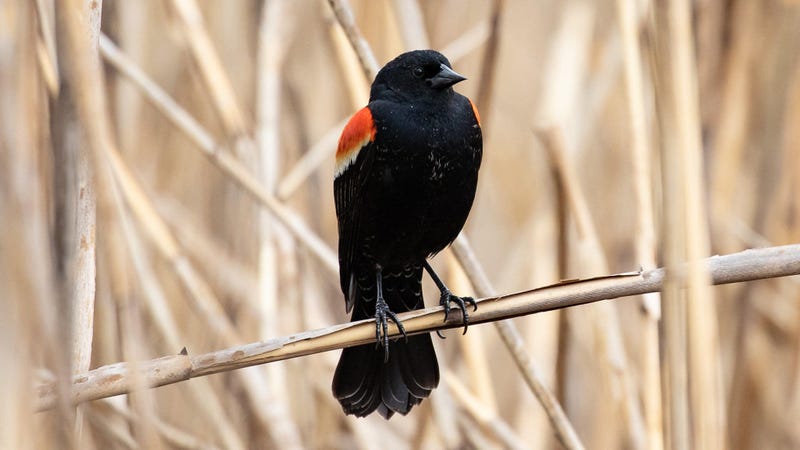 A red-winged blackbird showing off its red wings.Photo: Ryan F. Mandelbaum
A red-winged blackbird showing off its red wings.Photo: Ryan F. Mandelbaum
Birds are generally smarter than you think they are. And if you mess with their babies, they WILL attack.
There has been a recent uptick in reports of bird-on-human attacks, according to a recent Wall Street Journal article. The birds probably aren’t growing more aggressive—humans are just encroaching on their habitats. But yes, you should know that when summertime rolls around in the northern hemisphere, birds do not want you near their babies, and some might attack you.
The Wall Street Journal details several reports of folks minding their own business when suddenly a bird swoops down and attacks them. They wonder if their hairstyle or bike helmet induced the violence. I, too, have been attacked by birds several times—just last week, I left the house to take a closer look at a baby blue jay that was hopping along the sidewalk. I thought I was keeping my distance, but the baby’s parent disagreed, and flew low over my head with a loud squawk, spooking me so much that I nearly dropped my camera.
But, no, it wasn’t my clothes or bike helmet that the corvid was incensed by. The bird was just trying to protect its kid. I apologized to the bird (technically, I said “Sorry, sorry, alright already, I’m going, sheesh”), backed away, and wasn’t attacked again.
Many of North America’s native birds follow a predictable schedule: They migrate north in the spring to their preferred breeding habitats, they incubate and rear chicks for a few weeks or months, and then they return to southern climes in the fall. The WSJ’s cases mostly describe encounters with the red-winged blackbird, one of the country’s most abundant native birds, found in grasslands, wetlands, parks, and on roadsides. They build their nests in these lower areas and are especially territorial. It’s not just humans who are being attacked; red-winged blackbirds will commonly dive-bomb much bigger hawks.
One U.S. Fish and Wildlife Service volunteer wasn’t surprised by the behaviors detailed in the WSJ article. “This is common red-winged blackbird behavior this time of year,” Scott Lenhart from the Lenape National Wildlife Refuge Complex, told Gizmodo. “Males are vigorously defending breeding territories and will continue to do so until all the chicks have left the nests, typically in mid-to-late July. The issue seems to be more common when jogging/walking trails border or bisect red-winged blackbird habitat.”
So, are the birds more aggressive this year than they used to be? Certainly not. But the frequency of attacks might be on the rise, thanks to us humans, Andrea Jones, director of bird conservation for the California chapter of the National Audubon Society, told the BBC. Wildlife watching continues to grow in popularity, so more people are getting closer to birds. And, as the WSJ report notes, marsh and grassland habitat favored by red-winged blackbirds continues to shrink every year as humans develop the land, making the birds opt for habitats that are closer to us.
If you don’t want to be attacked by birds, the best thing is to opt for hiking and jogging in habitats where they don’t breed during the breeding season (running through the woods will mostly protect you from red-winged blackbirds, for example). If push comes to shove, wear a hat. You should also pressure your local, state, and federal government to pass more laws that protect habitats with native plants so humans and birds both have their spaces, and for laws that strive to counter the effects of climate change.
Whatever you do, don’t hurt the bird or its nest. The Migratory Bird Treaty Act makes it illegal to kill or own native birds (or their eggs), and also that’s just a really mean thing to do.
Share This Story